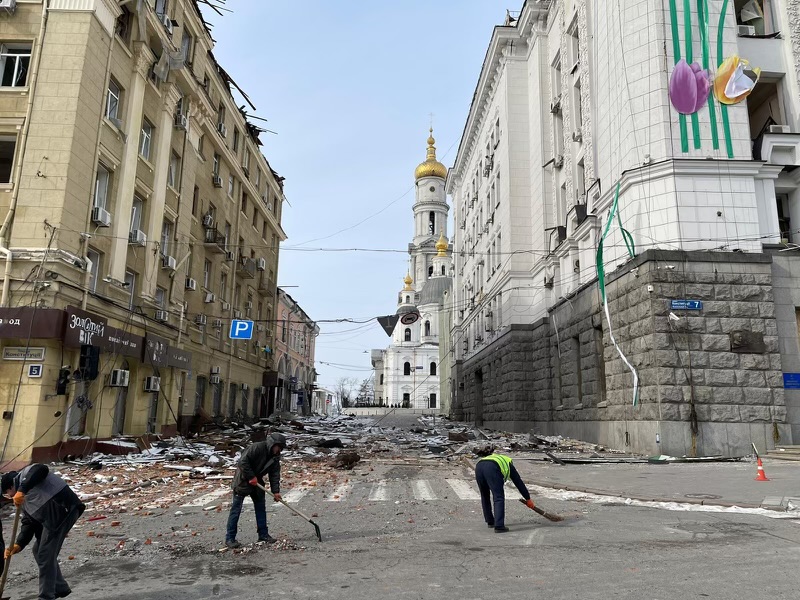The Russian-Ukrainian War: An Exclusive Interview With the Chief Foreign-Affairs Correspondent For ‘The Wall Street Journal’
A first hand account of the unraveling conflict in Ukraine.
Ukrainian citizens clear rubble caused by Russian artillery off of a street in Kharkiv.
The world watched in disbelief as Russia launched airstrikes and sent troops into its neighboring country, Ukraine, just before dawn on February 24, 2022, sparking Europe’s largest armed conflict since World War II. Since then, Russian troops have gained little ground. Fierce fighting has continued in the cities Kharkiv, Mariupol, Mykolaiv, and the capital Kyiv, but only the southern port city of Kherson and the rebel-held territories of Luhansk and Donetsk are under Russian control.
Ukraine has seemingly matched and resisted Russia’s superior military might, but as the conflict escalated some 3.2 million, mostly women and children, have fled the country, resulting in the fastest growing refugee crises in the 21st century.
In a virtual address to the U.S. Congress on March 16th, 2022, Ukraine’s President Volodymyr Zelensky urged the west to toughen international sanctions on Russia and to provide more military assistance, including jet fighters and antiaircraft weapons to defend itself. Mr. Zelensky also conceded that his country would not join NATO, a controversial decision that was the root of Russian aggression in the first place: Russian President Vladimir Putin warned that Ukraine joining NATO would threaten his country’s national security and be seen as international aggression.
As another round of peace talks between the two countries shows signs of a possible compromise, Russia’s military continues to bombard Ukrainian cities with intense shelling campaigns, causing close to 800 civilian deaths, including 58 children, and resulting in the U.S. President Joe Biden publicly condemning Mr. Putin as a “war criminal.”
Chief foreign-affairs correspondent from the Wall Street Journal, Yaroslav Trofimov, elaborates on the unfolding events and provides a first-hand account of the Russian-Ukrainian conflict in an exclusive interview that I conducted with him for The Science Survey.
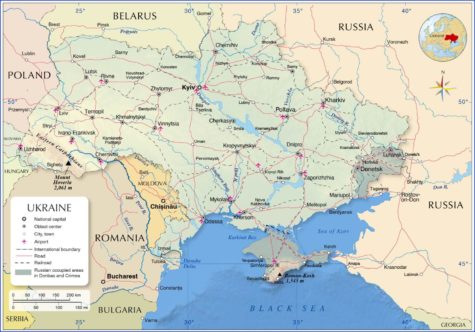
OW: You were initially based in Kyiv in January. Where are you reporting from now?
YT: I was in Kyiv in the beginning and then I traveled a bit to other places [such as] Kharkiv, which is the second largest largest city, and then to Zaporizhzhyia in the south. The situation is very different in Kharkiv. It’s much, much, much worse than Kyiv. The only place to sleep there was deep in the subway because there’s shelling the city center every day and every night.
OW: You’ve described Kyiv as a modern, bustling European city where people led normal lives. Does any trace of a “normal” life still exist in the capital since Russia invaded Ukraine?
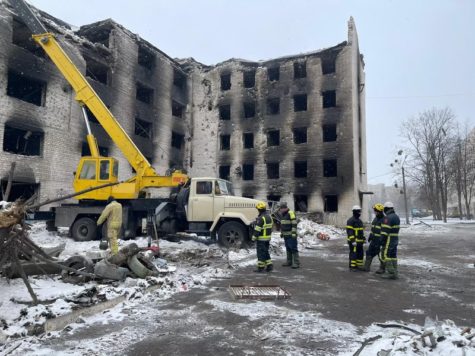
YT: There is still electricity, heat, and Wi-Fi. You can even pay with Apple Pay in most places. But the only things that are open in Kyiv are food stores and pharmacies. There are no restaurants. No bars. The sale of alcohol is prohibited, so you can’t buy beer anymore. Everything else is closed – all the clothing stores, libraries, electronic stores. The city has emptied out quite a bit – so a lot of women, children, and the elderly have left – and the men have gone on to fight in the military. The subway is now being used at night as a shelter for people who are sleeping there because they’re afraid of bombings.
Universities have definitely shut down and so have the schools. In some parts of the country, they’re doing remote learning. But as far as universities are concerned, students have gone on to fight if they’re of fighting age because it’s a war. Most other offices have also shut down. Only the essential industries and services – like supermarkets and pharmacies – are still operating.
OW: President Zelensky has publicly refused to leave to stay and fight. Do you think most Ukrainians have responded to this full-fledged invasion of their country with the same “we will win” attitude?
YT: Yes, Zelensky has refused to leave, and why should he leave? He was elected by 73 percent of Ukrainians. I think his behavior has really motivated a lot of other Ukrainians because the country is defiant, and the country refuses to surrender – and it’s fighting on. There was an opinion poll where more than 90 percent endorsed his attitude. Ukrainians do believe that they will win. They believe in their own strength. They believe that it’s impossible for the Russians to conquer it. So the people who are leaving the country are women and children and the elderly. Men of fighting age – and the fighting age is up to the age of 60 – are not allowed to leave the country, so they’re staying and joining the military or the territorial defense. Or they’re working in their principal occupations if they’re doing something that’s important, like doctors or drivers that ferry food and oil, or emergency personnel. But three million people have left the country already, mostly to Poland and then on to Europe. Ukraine does not need visas for the European Union so they can just go as they wish.
OW: How is this war different from others you’ve covered?
YT: It is the biggest war that I have covered. It’s the biggest war that has happened since World War II in Europe. It’s a war between two countries, both of which have big militaries and considerable resources.
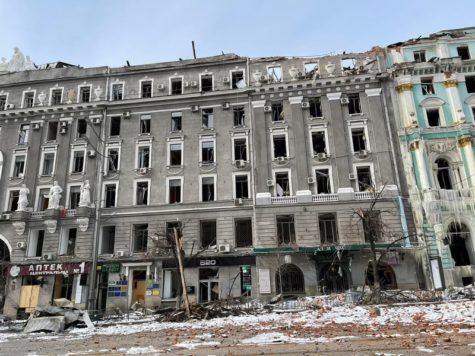
OW: Is social media helping Ukraine’s cause?
YT: Yes, obviously, it’s also about narrative. It’s really important for Ukrainians to rally their morale and to show that they can win, and that it’s not a lost cause because if people don’t believe that victory is possible, they will stop fighting. So the Ukrainians are very skillful at filming every time that they destroy Russian tanks or planes or helicopters and putting this out on social media to show that. “Hey, look! We are doing it.” It helps rally the morale in Ukraine, and it also helps demoralize the enemy.
OW: How bad is the humanitarian and refugee crisis? Are people still able to leave safely if Russia is targeting civilians?
YT: As far as evacuations go, it depends on really where you are. People who are afraid and want to leave, say, Kyiv or Kharkiv, can still do it safely. There are trains going to the border and they can cross it. But there are people trapped behind Russian lines, especially in the city of Mariupol, where about 400,000 people have been without electricity or water or new food supplies for about [several] weeks now. It’s very terrible there. That’s the town where the maternity ward was bombed by the Russians … For those people trapped behind Russian lines evacuation is very, very difficult and the Ukrainian government is trying to organize convoys. It’s trying to organize humanitarian corridors, but those evacuation buses are sometimes getting shot at. So there are still a lot of people trying to get out, including foreigners who are there. There are foreign students there, there are businessmen; there are lots of people caught in this situation who were not expecting the war to happen.
OW: We’re seeing heartbreaking images, like the photo of Tatiana Perebeinis and her two children. How are people handling the trauma of seeing Russia destroying their cities and killing innocent people?
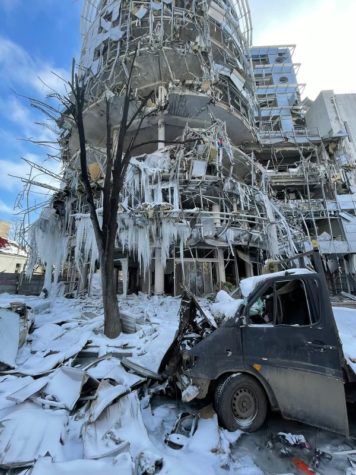
YT: You mentioned Tatiana Perebeinis. She was actually killed pretty much in front of my eyes. We walked past there about five minutes earlier and then we walked past there again and there she was lying on the floor. My colleague, the photographer, took a picture of that and wrote an article about her. We didn’t know her name at the time, obviously. It is traumatic for lots of kids – and for adults and for everyone. No one really expected to be reliving this sort of World War II situation again. An American friend of mine has two little nieces in Ukraine, and he took them to France. On their second day in Paris they went to see the Notre Dame Cathedral that burned down a few years ago [in 2019]. And this little girl asked my friend, “When it burned down, did the Russians drop a bomb on it?” So that’s … how people rationalize things. War is a terrible thing for everyone.
OW: Are war crimes being committed? Can you provide any examples?
YT: War crimes are definitely being committed. As I mentioned before, we saw how Russia was shelling civilians coming out of Irpin near Kyiv when Tatiana Perebeinis, her two children, and a young volunteer were killed. We have spoken to people living under Russian occupation about the killings, the lootings, and the other war crimes that are happening in the areas that Russia does control. In Kharkiv and in Kyiv – but mostly in Kharkiv – we do see indiscriminate shelling of civilian shelling of civilian neighborhoods. About 600 high rise apartment buildings in that city have been destroyed. So yeah, war crimes are happening everywhere. Ukrainian citizens walk down a street that was battered by bombing. For those who have decided to stay, scenes like this are their new reality.
OW: Is there concern among Ukrainians that Putin might use nuclear weapons?
YT: I don’t think that the Ukrainians – or anyone – else are really concerned that Putin will use nuclear weapons in Ukraine. At least I hope not. That would be a bridge too far even for him. But again, he has done things that people don’t expect him to do.
OW: What does the country need from the west to win this war?
YT: I think if you ask the Ukrainians, the first thing they say is we need help in closing the air because Russia is able to bomb this part of the country from the air with cruise missiles. What they want is the west to help set up a no fly zone. That’s very complicated because that might mean direct confrontation between NATO and Russian planes – and could lead to WWIII – so the west is reluctant to do that. But what they are doing is they’re providing the Ukrainians with more sophisticated air defenses.
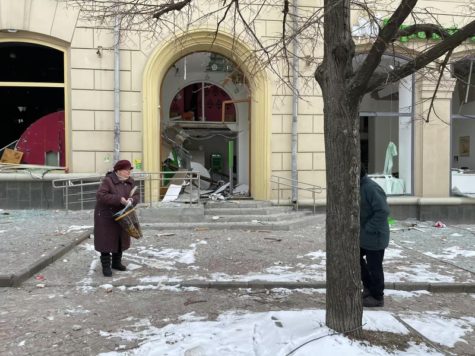
OW: Based on what you’re seeing on the ground, give us two scenarios how this might end?
YT: Russia was expected by the U.S. intelligence – and obviously by Putin himself – to have won this war in three days. The plan was to take Kyiv on day three. No one anticipated the fierce resistance that Ukraine put up, and now [we are multiple weeks] into the war and Kiev is not taken. All of Ukrainian regional capitals – all of its biggest cities except one – are still in Ukrainian hands. So can Ukraine win the war? I think it probably can. Certainly, it has fought them to a standstill. The Russian troops have not been able to advance anywhere in the past 10 days or so. And Ukraine is getting stronger every day. Its army is growing in size. It’s getting support – it’s getting new weapons from the west. And, certainly, the morale is high, whereas the Russian people were not told about this war until it started. It was a secret. It’s very hard for the Russians to understand what they’re fighting for and what they’re dying for. And the Russian losses have been very high.
Now, obviously, if Putin decides to go to total war and mobilize his reserves and send his entire army to Ukraine, [then] probably with sheer force they can take over Ukraine. But they probably won’t be able to keep it because there will be resistance. There will be an insurgency. There will be attacks, and the cost of occupying a country where everyone hates you is really high. So it doesn’t look like there are good options for Putin here. So that’s why the two countries are having talks now, to find a way, hopefully, to end this without a new escalation. Is it possible? Hard to tell.
“All of Ukrainian regional capitals – all of its biggest cities except one – are still in Ukrainian hands. So can Ukraine win the war? I think it probably can. Certainly, it has fought them to a standstill.” – Yaroslav Trofimov
Oliver Whelan is an Editor-in-Chief for ‘The Science Survey.’ He enjoys journalistic writing because of its ability to convey information on topics...

